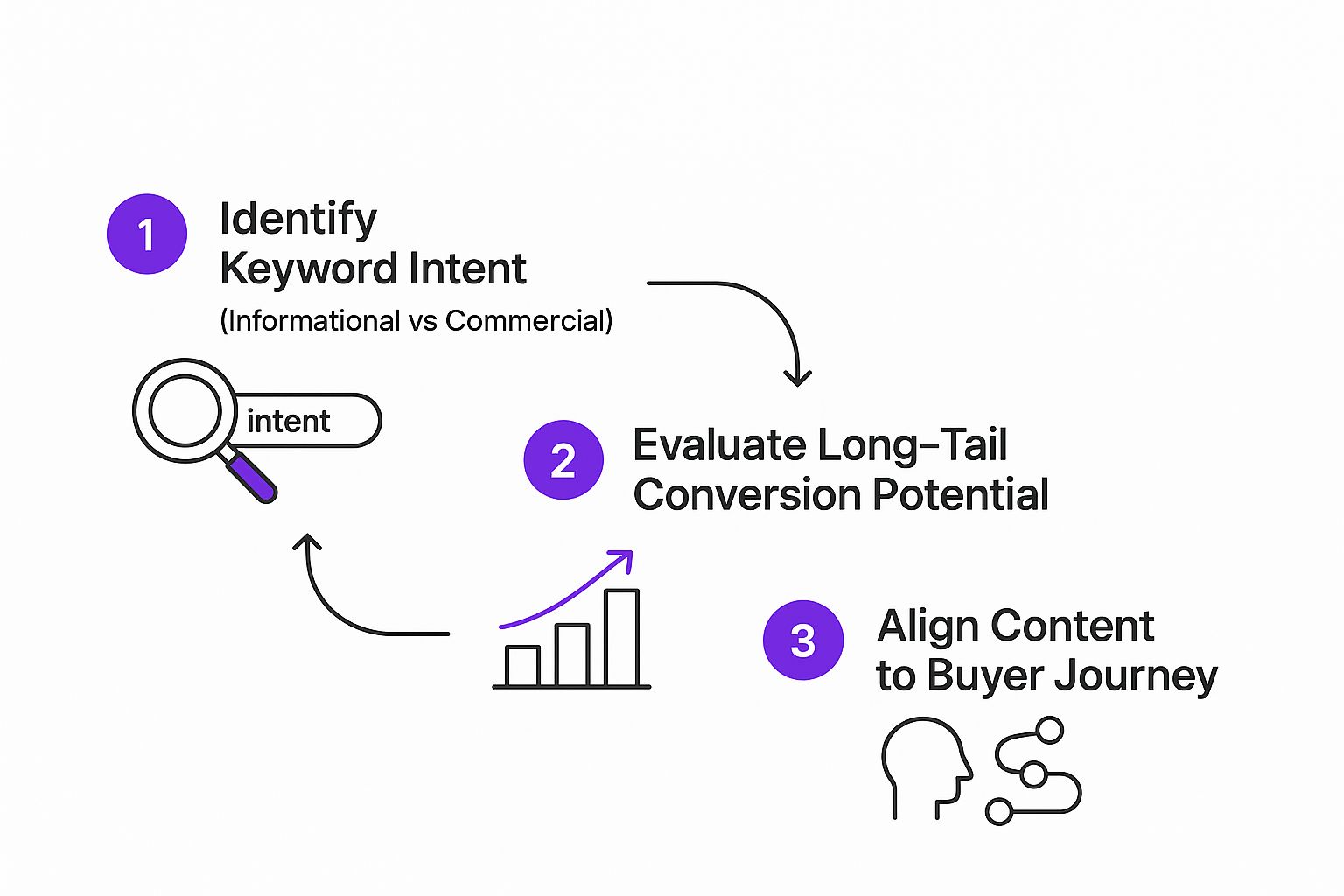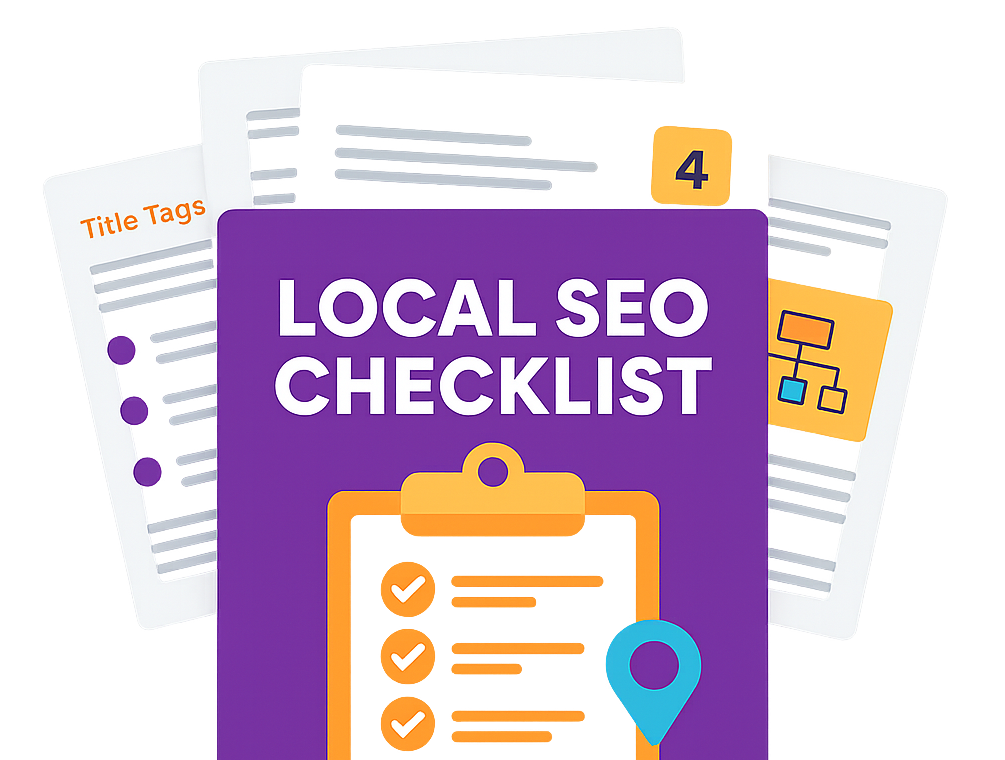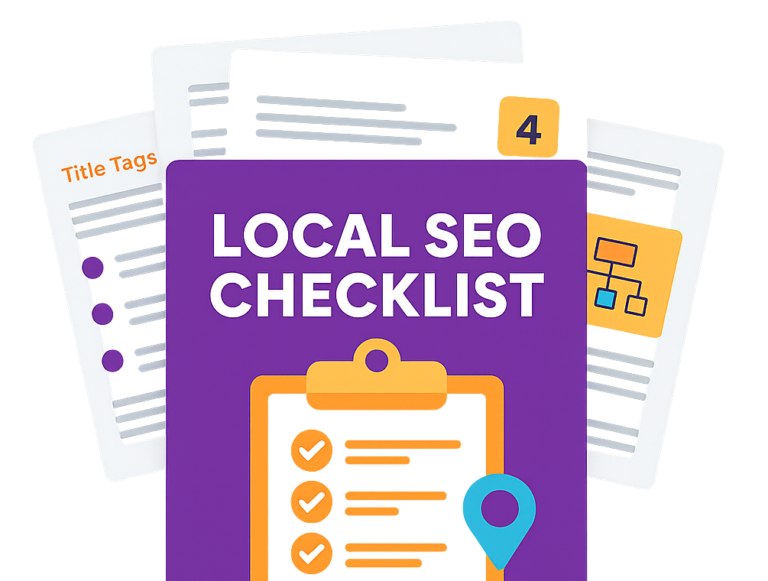At its core, keyword research is all about understanding the language of your customers. It’s the process of figuring out the exact words and phrases people are typing into search engines like Google when they’re looking for answers, products, or solutions. Think of it as the blueprint for your entire online marketing strategy. Without it, you’re just building in the dark.
Unlocking What Your Customers Really Want
Imagine you own a high street shop. You’d spend your days listening to customers, noting the questions they ask and the specific words they use to describe what they need. Keyword research is the digital version of that. It’s your way of “eavesdropping” on the massive, collective conversation your target market is having online. It’s less of a technical chore and more of a market intelligence mission.

When you get a handle on these search queries, you gain powerful insights that can inform everything from your next blog post to your new product line. This is a foundational pillar of digital marketing and search engine optimisation (SEO), especially for UK startups and SMEs where understanding online behaviour is directly tied to revenue. You can learn more about building a solid SEO strategy over at DigiData iMarketing.
Why It's a Non-Negotiable First Step
Here’s the thing: without proper keyword research, you’re essentially guessing what your audience cares about. This often leads to creating content that no one is actually looking for, which means all that time, effort, and money goes straight down the drain. A solid keyword strategy makes sure every move you make is targeted and effective.
Keyword research bridges the gap between the language your business uses and the language your customers use. Aligning the two is the first step towards getting found online.
Instead of just producing content and hoping for the best, this process allows you to:
- Pinpoint valuable topics: Discover what your audience is genuinely curious about.
- Attract the right people: Draw in visitors who are actively searching for the solutions you offer.
- Gauge market demand: Get a real sense of how popular certain products or services are before you invest heavily in them.
Simply put, knowing what keyword research is and how to do it right is the difference between shouting into an empty room and having a meaningful conversation with potential customers ready to listen. It’s the first, most critical play in any successful online game plan.
Why Your Business Can't Afford to Skip Keyword Research
Trying to grow your business online without doing keyword research is like setting off on a road trip without a map. Sure, you might get somewhere eventually, but you’ll waste a colossal amount of time, fuel, and energy on dead ends and wrong turns.
Proper keyword research is so much more than just another SEO task. Think of it as the market intelligence unit for your entire business.
Digging into search data gives you a direct, unfiltered line into the minds of your potential customers. You get to see exactly what they want, the problems they’re trying to solve, and the precise language they use to describe their needs. This isn't guesswork; it's solid data that points to real market demand.

This understanding lets you stop creating content you think your audience wants and start creating content you know they're actively looking for. The difference is night and day, shifting your strategy from shouting into the void to having a targeted, meaningful conversation.
Uncover Tangible Business Opportunities
Let’s make this real. Imagine a local bakery in Bristol that’s been putting all its online effort into general terms like "best cakes in Bristol." It seems logical, but it’s a fiercely competitive space already dominated by bigger, more established names.
Through some proper keyword research, the bakery owner uncovers a rising trend for "vegan birthday cakes Bristol" and "gluten-free celebration cakes." These aren't just search terms; they're specific, underserved customer needs screaming for a solution.
This single insight gives them a crystal-clear roadmap:
- Smarter Content Creation: They can now write a blog post titled "Where to Find Bristol's Best Vegan Birthday Cakes" or build a dedicated page for their gluten-free range.
- Informed Product Development: Seeing the demand, they can confidently invest in developing and promoting a new line of vegan and gluten-free treats.
- Sharpened Competitive Edge: By targeting these more specific, long-tail keywords, they can attract highly motivated buyers and carve out a profitable niche that larger competitors are completely overlooking.
This kind of strategic pivot is only possible when you see keyword research for what it truly is: a tool for discovering what your customers actually want to buy.
By listening to what people search for, you're not just optimising for Google; you're optimising your business for your customers. It’s about attracting the right traffic, not just more traffic.
From Vague Metrics to Real ROI
At the end of the day, any marketing you do has to deliver a positive return on investment. Without keyword research, you might see your website traffic go up, but it could be full of people who have zero intention of ever buying from you. This just leads to high bounce rates and dismal conversion figures, burning through your marketing budget.
Targeting the right keywords ensures the visitors landing on your site are genuinely interested. They’re already looking for the solutions you offer, which means they are far more likely to become high-quality leads and, eventually, paying customers.
This leads to a healthier, more predictable return on your marketing spend and sustainable business growth. It’s the foundation every successful digital strategy is built on.
Decoding the Language of Your Customers
Thinking all keywords are the same is an easy mistake to make, but it's a costly one. The truth is, not all keywords are created equal. Why? Because behind every single search query is a real person with a specific goal. Getting a handle on this customer intent is the secret to building a content strategy that actually delivers results.
Every time someone types a phrase into Google, they're on a mission. Our job as business owners and marketers is to figure out what that mission is. We need to move past the literal words they're typing and get inside their heads to understand what they really want.
To pull this off, we have to start categorising keywords based on the searcher's underlying goal.
The Four Main Flavours of Search Intent
It turns out that most search queries can be neatly sorted into one of four main categories. Knowing the difference is fundamental, as it allows you to match your content perfectly to what your audience needs in that exact moment.
-
Informational Intent: The searcher is looking for answers or trying to learn something new. Their queries are often questions, like "how to unblock a sink" or "what is capital gains tax?". They're in research mode.
-
Navigational Intent: The user already knows their destination and is simply using Google as a quick way to get there. Think of searches like "Currys PC World near me" or "log in to NatWest online banking".
-
Commercial Intent: Here, the user is getting serious about a purchase. They're weighing up their options, comparing products, and hunting for reviews to find the best fit. Searches like "best accounting software for small business UK" or "Samsung vs iPhone camera" fall squarely into this camp.
-
Transactional Intent: This person has their wallet out and is ready to buy. Their search terms are direct and signal a clear desire to make a purchase, right now. You'll see queries like "buy Nike Air Max size 9" or "cheap flights to Amsterdam".
Research confirms that UK search behaviour mirrors global trends, with roughly 52.65% of searches being informational. While commercial and transactional queries are a smaller slice of the pie, they're incredibly valuable. Understanding this breakdown helps you create the right content for every stage of the customer journey. If you're keen to dig deeper, Statista offers some great insights into UK search trends.
This simple workflow shows how to put intent at the heart of your keyword strategy.

The big takeaway? Identifying intent isn't just a box to tick—it's the foundational first step that should guide every single decision you make in your content and SEO efforts.
To help you get this right, here’s a simple table that breaks down how each keyword type connects to your customer's mindset and the content you should create.
Keyword Types and Matching Customer Intent
This table illustrates how to align your content with what your customers are actually looking for at each stage.
| Keyword Type | Customer Mindset | Example (UK Context) | Effective Content Strategy |
|---|---|---|---|
| Informational | "I need to learn about something." | "how to fix a dripping tap" | Blog posts, how-to guides, infographics, educational videos. |
| Navigational | "I want to go to a specific website." | "Screwfix login" | A well-optimised homepage and clear site navigation. |
| Commercial | "I need help choosing the best option." | "best cordless drills for DIY" | Product comparisons, in-depth reviews, case studies, buying guides. |
| Transactional | "I'm ready to buy this now." | "buy DeWalt drill set online" | Optimised product pages, ecommerce category pages, targeted offers. |
By matching your content to these different mindsets, you meet your customers exactly where they are, building trust and guiding them naturally toward a sale.
Your Secret Weapon: Long-Tail Keywords
Now, let's talk about a powerful tool that can give smaller UK businesses a serious edge: long-tail keywords. These are longer, more specific search phrases, typically made up of three or more words.
A broad term like "shoes" might get millions of searches, but it's fiercely competitive, and the searcher's intent is a complete mystery. In sharp contrast, a long-tail keyword like "buy men's waterproof walking shoes size 10 UK" has far less search volume, but the intent is crystal clear.
Long-tail keywords are a game-changer because they attract users who are much further along in their buying journey. The person searching is no longer just browsing; they know exactly what they want.
For small and medium-sized businesses, these specific queries are a goldmine. They usually have much less competition, which makes it far easier for you to land on the first page of Google. More importantly, the traffic they generate is highly qualified and converts at a significantly higher rate. Focusing on them allows you to outmanoeuvre larger competitors by carving out and dominating valuable, underserved niches. You can learn more about the power of long-tail keywords in our dedicated guide.
A Practical Keyword Research Workflow
Right, theory is one thing, but how do you actually do keyword research? It’s not some dark art reserved for SEO experts. Think of it as a logical process anyone can follow to get inside the heads of their customers.
This workflow breaks it all down into simple, manageable steps. We'll go from a massive, messy list of potential keywords to a smart, strategic content plan.
Step 1: Brainstorm Your Seed Keywords
Before you even think about opening a tool, start with what you know best: your business and your customers. We’re looking for seed keywords here – the big, foundational topics that define what you do. These are usually broad, one or two-word terms that get to the heart of your industry.
Put yourself in your customer's shoes. If you’re a plumber in Cambridge, your seed keywords are probably things like "plumber," "boiler repair," and "blocked drains." Sell handmade leather goods? Then you're looking at "leather wallet," "briefcase," and "men's belts."
Just jot down a list of these core ideas. Don't overthink it. The goal is just to get a solid starting point for what comes next.
Step 2: Expand Your List with Keyword Tools
Got your seed keywords? Good. Now it’s time to see what people are actually searching for. This is where keyword research tools come in. When you pop a seed keyword like "boiler repair" into a tool, it will spit back hundreds, sometimes thousands, of related phrases.
This is where the magic happens. You’ll start uncovering the specific questions, problems, and needs of your audience. You'll go from the broad "boiler repair" to much more valuable, specific terms like:
- "emergency boiler repair cambridge" (Someone needs help, now!)
- "how much does a boiler service cost uk" (They're weighing up their options.)
- "worcester bosch boiler losing pressure" (A cry for help and information.)
These longer, more detailed phrases are the gold dust. They tell you exactly what your potential customers need from you.
Step 3: Analyse and Group by Intent
That expanded list you have is probably enormous. The next step is to bring some order to the chaos. This means looking at each keyword and grouping it based on the customer intent we talked about earlier—is it informational, commercial, or transactional?
A simple spreadsheet is your best friend here. Create columns for the keyword, its monthly search volume, keyword difficulty (most tools give you this), and the most important one: ‘Intent’.
Grouping keywords by intent is the crucial link between your research and your content strategy. It tells you what kind of content you need to create to satisfy each searcher's needs.
For instance, all the "how to" and "what is" keywords can be bundled into an 'Informational' group, ready for some helpful blog posts. The "best" and "review" keywords? They fit neatly into a 'Commercial' bucket for comparison guides. And finally, any terms with words like "buy" or "for sale" are clearly 'Transactional' and should be pointed directly at your product or service pages.
Step 4: Prioritise and Build Content Clusters
The final step is all about making choices. You simply can't target every keyword at once. You need to prioritise. Look for the sweet spot: keywords with a decent amount of search volume, a difficulty score you can realistically compete for, and high relevance to what you actually sell.
From here, you can start organising these keywords into topic clusters. This is a modern approach to SEO where you create a main "pillar" page on a broad topic (like a "Complete Guide to Boiler Servicing") and then support it with several "cluster" pages that dive into related, specific subtopics (e.g., "Signs You Need a Boiler Service," or "How to Repressurise Your Boiler").
All these cluster pages link back to the main pillar page. This sends a powerful signal to search engines that you’re an authority on the subject, helping you rank for a whole range of related terms. If you want to dive deeper into the nuts and bolts, this guide on how to conduct keyword research is a great next step.
Choosing Your Keyword Research Toolkit
Getting started with keyword research doesn't mean you need to splash out on a complicated, expensive software suite. There's a brilliant range of powerful tools out there, and many of them are completely free, giving you all the data you need to figure out what your UK customers are actually searching for.
The trick is to pick the right tool for your specific needs, budget, and experience level. Get this right from the start, and you'll have the perfect setup to unearth those golden customer insights.
Free Tools to Get You Started
For many small and medium-sized UK businesses, the free tools on the market are more than powerful enough to build a really solid keyword strategy. Think of them as your entry point—a way to gather essential data without having to spend a penny.
- Google Keyword Planner: This is the original, and it’s still one of the most useful freebies around. It was built for advertisers, which means it gives you direct access to Google’s own search data. It’s fantastic for brainstorming new keyword ideas and getting a feel for search volume ranges.
- Google Trends: A brilliant tool for spotting what’s hot and what’s not. You can use it to understand seasonal demand in the UK market and compare the popularity of different search terms over time. This helps you jump on rising interest before your competitors even notice it.
- AnswerThePublic: This tool is a goldmine for understanding your audience's mindset. It visualises all the questions, comparisons, and prepositions people use when they search for a topic, showing you the exact problems they’re trying to solve.
Here’s a quick look at the Google Keyword Planner. It’s designed to be straightforward, letting you discover new keywords or check search volumes right away.
As you can see, it prompts you to pop in a few 'seed' keywords to kick off your research.
Professional SEO Suites
When you're ready to get serious and take your keyword research up a gear, professional all-in-one SEO platforms are the way to go. They offer much deeper insights and a clear view of what your competitors are up to. These are paid services, usually starting from around £80 per month.
Investing in a professional tool isn’t just about getting more data; it's about being more efficient. These platforms pull keyword discovery, competitor analysis, and rank tracking all into one place, saving you a massive amount of time.
Popular suites like Ahrefs, Semrush, and Moz offer more precise data on search volumes and even calculate a "keyword difficulty" score to help you prioritise your efforts. But their killer feature is the ability to see exactly which keywords your competitors are ranking for. This alone can uncover huge opportunities you’d have otherwise missed. For a detailed breakdown, check out our guide on choosing the best SEO software.
Comparing Top Keyword Research Tools for UK Businesses
To help you decide which tool is the best fit for your business needs and budget, here’s a quick comparison of our top free and paid picks.
| Tool Name | Best For | Key UK Feature | Price Point |
|---|---|---|---|
| Google Keyword Planner | Businesses on a tight budget starting with keyword research. | Direct access to Google's UK search volume data. | Free |
| AnswerThePublic | Understanding customer questions and content ideas. | Filters results by UK region for localised insights. | Free (with limits) |
| Ahrefs | In-depth competitor analysis and backlink tracking. | Accurate UK-specific keyword difficulty scores. | Paid (from ~£80/mo) |
| Semrush | All-in-one SEO, PPC, and content marketing analysis. | Comprehensive database of UK search terms. | Paid (from ~£105/mo) |
Whether you go for a free tool or a paid suite, the right choice ultimately depends on your goals. Free tools are perfect for building a foundation, while paid platforms offer the advanced features needed to scale your efforts and gain a competitive edge.
One last thing—and this is critical. Whichever tool you use, make sure you set your target location to the United Kingdom. This ensures the search data is relevant to your local audience, not a global one. Search behaviour can differ massively between the UK and the US, so localising your data is a non-negotiable step for getting accurate insights. Your choice of tool will ultimately shape how effectively you can perform an analysis of what keyword research can reveal about your market.
How To Find And Prioritise Winning Keywords
So, you've got a long list of potential keywords. That’s a great first step, but a list on its own won't get you very far. The real magic happens when you know how to pick the winners—the golden opportunities that will actually move the needle for your business.

This whole process boils down to striking a careful balance between three things: how relevant a keyword is to what you actually sell, how many people are searching for it, and how tough it is to rank for. Nail this balance, and you’ll turn raw data into real growth.
Striking The Right Balance
When you're staring at your keyword list, it's easy to get drawn to the big numbers—the terms with massive search volumes. But here's the catch: those are almost always brutally competitive, making them a tough hill to climb for a newer business. A smarter approach is needed.
A winning keyword needs to tick three boxes:
- High Relevance: Does the searcher’s intent line up perfectly with what you offer?
- Decent Search Volume: Are enough people actually looking for this term to make it worth your time?
- Achievable Difficulty: Can your website realistically fight for a spot on the first page?
For most new UK businesses, the sweet spot is in the low-competition keywords. Sure, they might have smaller search volumes, but they're far easier to rank for. This lets you build momentum, establish authority, and attract highly motivated customers right out of the gate.
The Power Of Low-Competition Keywords
With Google UK handling over 97% of mobile search traffic, the competition for broad, popular keywords is fierce. But here’s an interesting fact: over 94% of keywords worldwide get fewer than ten searches a month. This tells us there's a huge, untapped world of niche, low-competition terms just waiting to be claimed. For smaller UK businesses, these are the key to accumulating steady, targeted organic traffic.
Prioritising keywords isn't about finding the most popular terms; it's about finding the most profitable terms for your business. A keyword with 50 monthly searches that converts is far more valuable than one with 5,000 that doesn't.
Our guide on how to choose keywords for your website goes much deeper into making these kinds of strategic choices.
Ethically Spy On Your Competitors
One of the sneakiest—and most effective—ways to find winning keywords is to see what's already working for your rivals. This isn’t about blindly copying their strategy. It’s about figuring out what they’re doing right and, more importantly, finding the gaps they’ve left wide open for you.
A crucial part of this is doing a proper SEO competitive keyword analysis to get a lay of the land. Using SEO tools, you can plug in a competitor’s website and see a list of the exact keywords that send them the most traffic.
Look for the keywords where their content feels a bit weak, is out of date, or just doesn't quite answer the searcher's question. Those are your openings. By creating superior, more helpful content for those same terms, you can strategically outmanoeuvre them and start siphoning off some of their traffic. It’s all about turning their hard work into your advantage.
A Few Common Keyword Research Questions Answered
As you get your head around what keyword research can do for your business, a few questions always seem to pop up. Getting straight answers to these is the key to building a strategy that actually works, without any guesswork.
This final section cuts through the noise and tackles the most frequent queries we hear from UK businesses, helping you get past any sticking points.
How Often Should I Do Keyword Research?
Keyword research is definitely not a ‘set it and forget it’ task. It’s more like an ongoing conversation with your market. While you’ll want to do a really deep dive when you launch a new website or service, regular check-ins are crucial.
A quarterly or bi-annual refresh is a smart move. Customer behaviour changes, new trends appear out of nowhere, and your competitors are always tweaking their own strategies. Staying on top of these shifts makes sure your SEO and content plan stays sharp and effective.
What Is a Good Monthly Search Volume?
This is a classic question, but there’s no single magic number. It’s so easy to get drawn to a keyword with 10,000 monthly searches, but those terms are almost always hyper-competitive and far too general.
For most UK businesses, a cluster of long-tail keywords with 50-200 searches each can be way more valuable. These more specific phrases often signal much stronger buying intent and are a whole lot easier to rank for.
Prioritise relevance and intent over raw search volume. It's always better to attract ten genuinely interested potential customers than a thousand casual browsers who will never convert.
Is It a Bad Idea to Target Just One Main Keyword?
Yes, putting all your eggs in one keyword basket is an outdated and pretty ineffective approach. Modern search engine optimisation is all about proving your topical authority.
Instead of focusing only on a broad term like 'manchester accountant', you should aim to build a content 'cluster' around it. This means creating helpful content for related, more specific terms like 'small business tax returns uk', 'how much does an accountant cost', and 'making tax digital software'.
This approach shows search engines that you're a genuine expert on the entire subject, which boosts your rankings for a whole host of related queries. It’s a core principle in the shift towards what’s known as answer engine optimisation, where providing comprehensive answers gets rewarded.
Ready to transform your keyword research from a guessing game into a growth engine? Bare Digital offers a free SEO Health Check to uncover your biggest opportunities. Discover how our specialist SEO services can boost your rankings and drive real results.








